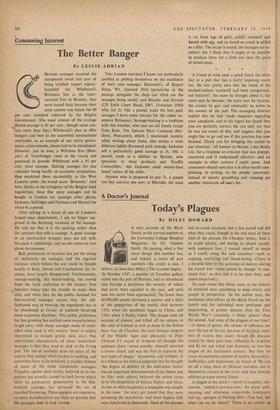Consuming Interest
The Better Banger
By LESLIE ADRIAN Bamsn sausages received the unexpected insult last year of being labelled 'export rejects.' Intended for Whitbread's Britannia Inn at the Inter- national Fair in Brussels, they were turned back because their meat content was below the 90 per cent. standard enforced by the Belgian Government. (The meat content of the average British sausage is 65 per cent., though some con- tain more than that.) Whitbread's plan to offer bangers and beer to the assembled international multitudes, as an example of our native gastro- nomic achievements, almost had to be abandoned. However, just in time, a Wiltshire firm (Bow- yer's of Trowbridge) came to the rescue and promised to provide Whitbread with a 95 per cent, meat sausage. Making sausages for one customer being hardly an economic proposition, they marketed them successfully in the West Country under the brand name 'Britannia.' And now, thanks to the stringency of the Belgian food regulations, these fine spicy sausages can be bought in London (at, amongst other places, Jacksons, Selfridges and Fortnum and Mason) for about 4s. a pound.
After talking to a buyer of one of London's largest meat departments, I am no longer sur- prised at the declining standard of the sausage. He told me that it is the packing rather than the contents that sells a sausage. A good sausage in an unattractive wrapper does not sell well, but pack it appealingly and no one seems to care about the contents.
Bulk production in factories has put the stamp of uniformity on sausages, and the regional varieties which before the war could be bought locally in Kent, Devon and Cumberland, for in- stance, have largely disappeared. Unfortunately, sausage-making, like bread-making, has moved from the local craftsman to the factory. Few butchers today take the . trouble to make their own, and when they do the public demand for fine-textured sausages means that the old- fashioned way of mincing the ingredients has to be abandoned in favour of methods involving more expensive machines. This public preference for fine grinding has enabled some manufacturers to get away with cheap sausages made of emul- sified meat (and in this context 'meat' is widely interpreted to include gristle, skin, etc.). One unfortunate characteristic of these 'emulsified' sausages is that they tend to stick to the frying pan. The use of synthetic skins (in place of the natural hog casing) which harden in cooking, and sometimes have to be removed, is another 'feature of some of the more inexpensive sausages. Prejudice against dark marks, believed to be im- purities but actually caused by herb leaves which show up particularly prominently in the fine- textured sausages, has increased the use of liquefied flavouring. These essences are expensive, so many manufacturers use them so sparsely that the sausages tend to lack savour. Two London butchers I know are particularly justified in priding themselves on the excellence of their own sausages. Hammett's, of Rupert Street, WI, Gerrard 3014 (passers-by in the passage alongside the shop can often see the sausages being made), and Hornby and Maxted (129 Earls Court Road, SW5, Frobisher 2589) who, for 2s. 10d. a pound, make the best pork sausages I have eaten (except for the rather ex- pensive Britannia). Sausage-making is a tradition with this butcher, who uses an old family recipe from Kent. The Epicure Ham Company (Per- shore, Worcester), which I mentioned recently when writing about hams, also makes a most delicious lightly-flavoured pork sausage. Jacksons sell a particularly good sausage at 3s. 10d. a pound, made as a sideline by Benoist, who specialise in meat products and `Frerith Comestibles,' but Jacksons need twenty-four hours' notice of the order.
Anyone who is prepared to pay 7s. a pound can buy suucisse pur pore at Harrods; the meat is cut from legs of pork, mildly seasoned and bound with egg, and no bread or cereal is added as a filler. The recipe is sound; the sausages are ex- cellent; but I think that it ought to be possible to produce them for a little less than the price of sirloin steak.
A friend of mine took a quick lunch the other day at a pub that has a fairly imposing snack bar. He was pretty sure that the bread of his smoked-salmon sandwich had been margarined, not buttered: the more he thought about it, the more sure he became; the more sure he became, the crosser he got; and eventually he wrote to the owners of the pub. The managing director replied that he had 'made enquiries regarding your complaint, and to his regret has found that you are perfectly correct. He can only say that he was not aware of this, and suggests that you might like to go and see if this practice has now finished. Thank you for bringing this matter to our attention.' All honour to Messrs. Luke Brady Ltd. for a response to criticism that was prompt, courteous and (I understand) effective—and an example to other caterers I could name. And consumers should note that it is often worth com- plaining, in writing, to the people concerned, instead of merely grumbling and crossing yet another restaurant off one's list.


































 Previous page
Previous page